By: Ishita Goel J , Umme Kulsum
October 21 2024
.webp) Ahead of 2024 U.S presidential elections, social media influencers have been found spreading misinformation. (Source: Logically Facts)
Ahead of 2024 U.S presidential elections, social media influencers have been found spreading misinformation. (Source: Logically Facts)
On September 11, 2024, far-right activist and conspiracy theorist Laura Loomer shared an unsubstantiated claim on X (formerly Twitter) that incumbent U.S. Vice President and Democratic presidential candidate Kamala Harris wore an earpiece during the presidential debate held on September 10.
Loomer is a former Republican congressional candidate with 1.3 million followers on X, who has gained notoriety for spreading conspiracy theories and advocating anti-immigrant and anti-Muslim rhetoric. With over three million views, her post went viral, turning a false claim into a trending topic.
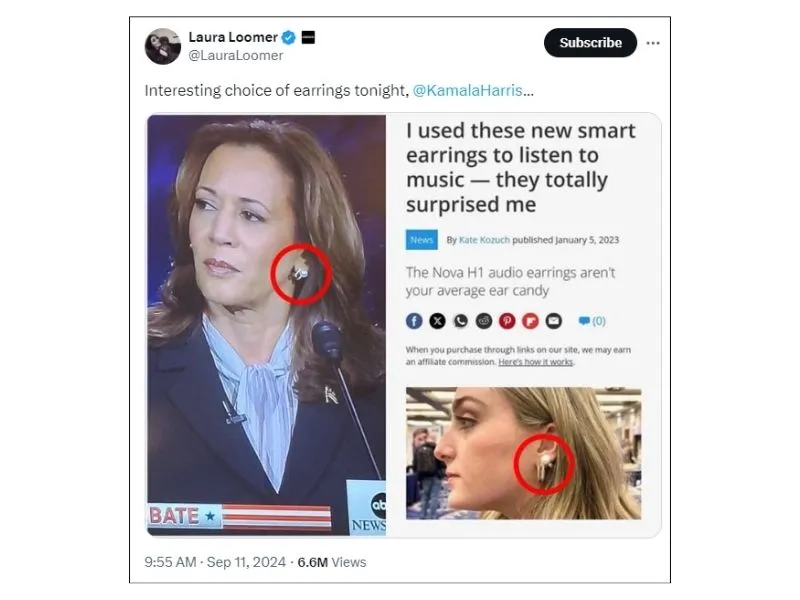
Screenshots of social media posts by Laura Loomer. (Source: Screenshots/X/Modified by Logically Facts)
Loomer also amplified the former U.S. President and Republican presidential candidate Donald Trump's false claim during the September 2024 debate that Haitian immigrants were "eating cats and dogs" in Ohio.
Similarly, Dan Bongino, a conservative commentator with a history of fueling distrust in the U.S. electoral system, has been attempting to sow doubts about the Democratic candidates and spreading conspiracy theories through Rumble videos, shared mainly on Facebook, where he has a blue tick and 5.7 million followers.
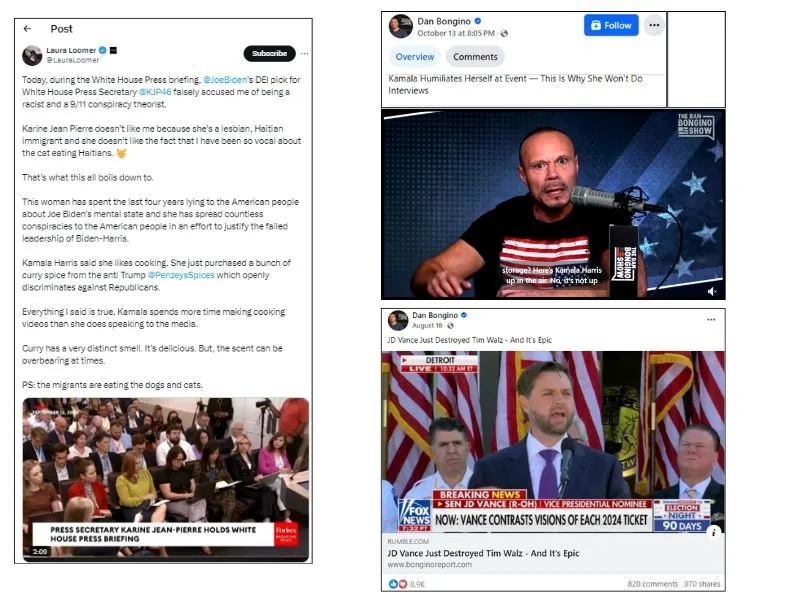
Screenshots of social media posts by influencers. (Source: Screenshots/X/Facebook/Modified by Logically Facts)
Influencers and content creators have evolved into powerful voices, shaping opinions and setting the tone on important issues. They are no longer confined to brand endorsements or marketing campaigns and have moved into the political realm, playing a growing role in how people access and interact with political information.
This story examines how some of these influencers are shaping public discourse in the upcoming U.S. elections.
Candace Owens, a political commentator in the U.S., has 1.4 million subscribers on YouTube and over five million followers on X. Owens frequently discusses election integrity on her podcast, raising doubts about the 2020 election and shaping perceptions for the 2024 cycle.
On September 25, 2024, Owens shared a podcast on her YouTube channel talking about Harris’ 2019 memoir, claiming that the U.S. vice president published photos of herself with a woman she claimed was her paternal grandmother. Owens also claimed that Harris’ grandmother died four years before she was born. While the claim is demonstrably false, her video received 1.4 million views.
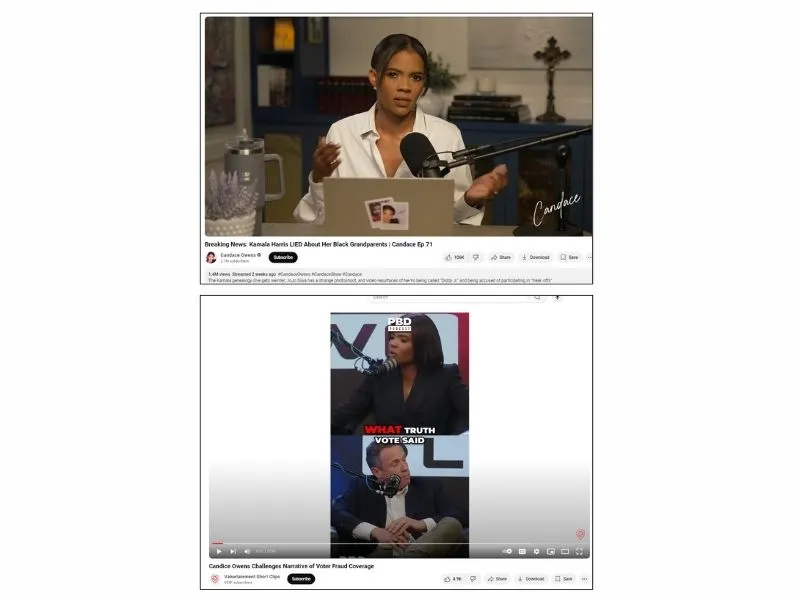
Screenshots of social media posts by Candace Owens. (Source: Screenshots/YouTube/Modified by Logically Facts)
Other social media personalities like Matt Wallace (2.2 million followers on X), commentator Jackson Hinkle (2.8 million followers on X), and far-right radio host and conspiracy theorist Alex Jones (2.8 million followers on X), among others, have grown to be a force of their own in influencing opinions and undermining democratic institutions and candidates.
Logically Facts analyzed the social media accounts of some of these prominent content creators and influencers between May and October 2024 and found that several of these accounts have shown a consistent pattern of disseminating false or misleading content.
On October 10, entrepreneur and angel investor turned internet personality Mario Nawfal, who has 1.7 million followers, shared a post about an alleged plan to pay Trump five billion dollars not to run, and made a false claim about Harris lying about owning a gun, while Jones, on his show ‘Infowars’, posted the bizarre theory that ‘Kamala Harris May Be A Space Alien’ and claimed erroneously that Texas will allow non-citizens to vote in the election. Despite no evidence for any of these claims, they garnered thousands of views.
But that’s not where it ends. Wallace shared an image of an ‘I Voted’ sticker, alleging that the presence of many languages on the stickers is evidence of cheating. He also posted a video on Rumble that claimed Harris was ‘fully compromised’ and insinuated that she has a body double. This video was also cross-shared on X.
Hinkle, on the other hand, claimed without evidence that the 2020 U.S. election had been stolen. All of their posts received significant views, likes, and reposts, fuelling discussion about the narratives.
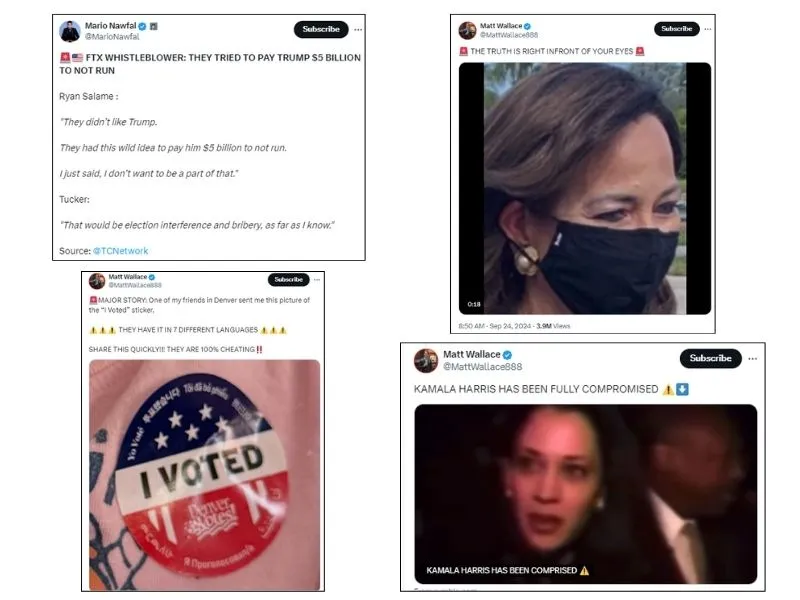
Screenshots of social media posts by influencers. (Source: Screenshots/X/Modified by Logically Facts)
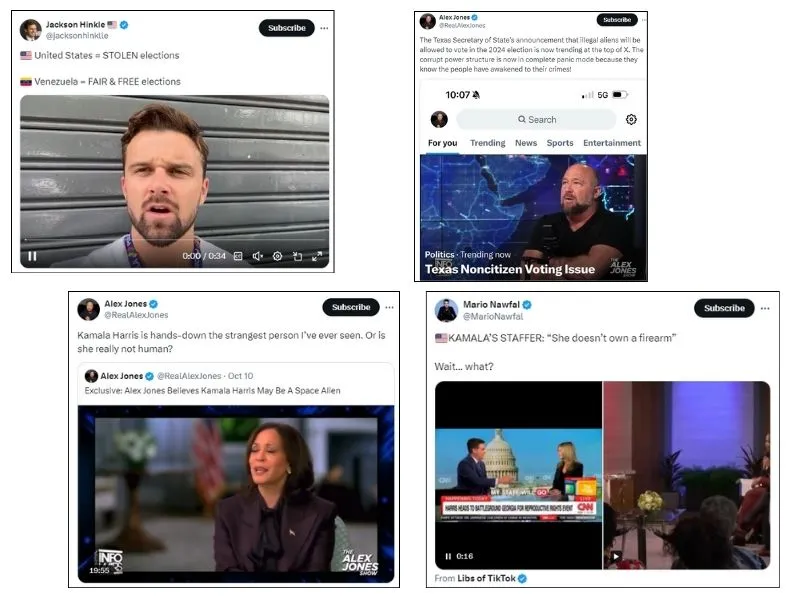
Screenshots of claims by Jones, Hinkle, and Nawfal. (Source: Screenshots/X)
Others like conservative political commentator and YouTuber Benny Johnson (2.49 million subscribers), comedian JP Sears (3.06 million subscribers), and comedian, political commentator, podcaster, and YouTuber Jimmy Dore (1.43 million subscribers), have also become influential voices in U.S. politics.
Sears posted an altered video of Harris on Instagram alleging she was drunk and speaking gibberish. Dore shared a video on YouTube in October alleging that she would be installed as president undemocratically, insinuating that the elections are rigged. However, it is important to note that the video description reads, “#TheJimmyDoreShow is a hilarious and irreverent take on news, politics and culture.”
We also reached out to Dore for a comment on these videos, but we were met with questions instead of any clarification.
In October, on X, Johnson falsely alleged that Harris had used a teleprompter at her town hall and shared an edited video of Walz claiming he made statements against the Biden/Harris administration.
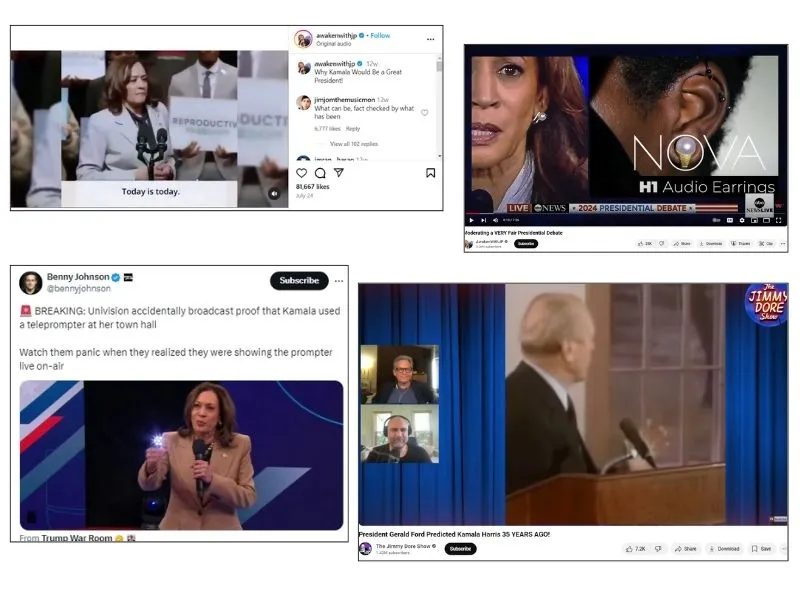
Screenshots of social media posts by influencers. (Source: Screenshots/X/YouTube)
Such posts often lack evidence and have vague details, but they raise questions about election integrity, perpetuate narratives about election fraud, and spread conspiracy theories.
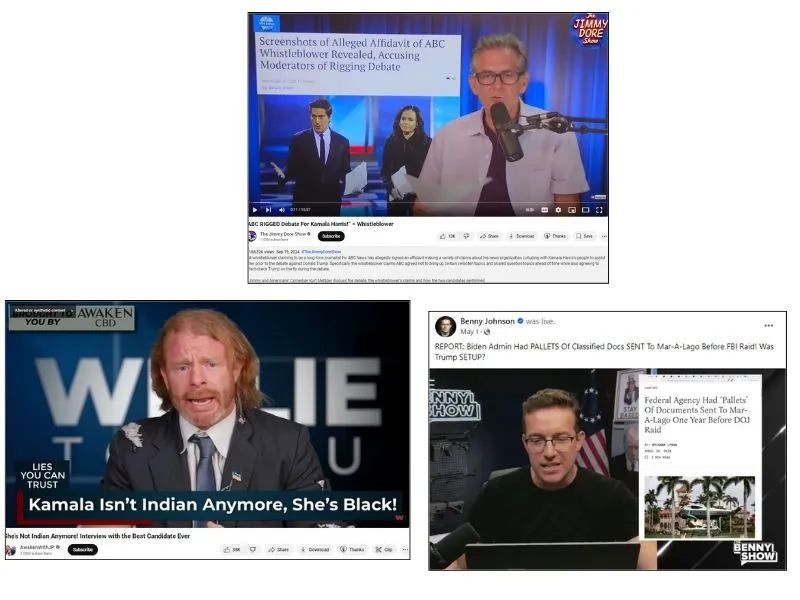
Examples of posts by Sears, Dore, and Johnson that spread misleading information about the U.S. election. (Source: Screenshots/YouTube/Facebook)
Roxana Mika Muenster, a doctoral student at Cornell University who studies far-right and digital communication, said, “It’s sort of throwing everything against the wall and seeing what sticks, especially on the far-right side of things where we have all types of conspiracies. They’re trying all these attack lines in the campaign to see which one will be the most effective. It’s enough that there are all these misinformation materials and conspiracies out there to make everyone doubt everything, which I think is one of the scariest things.”
Some of these influencers, like Johnson, were known for amplifying misinformation about candidates and the electoral process during the 2020 U.S. election. On November 4, 2020, early in the morning of election day, he shared the false claim on X that Democrat-led states where Trump was winning stopped counting votes on election night.
Similarly, Dore had shared a video to falsely accuse Biden of participating in a “‘Black Face’ skit.” Jones, meanwhile, was heavily involved in spreading conspiracy theories related to the election, including the popular allegation that the election was “stolen”.
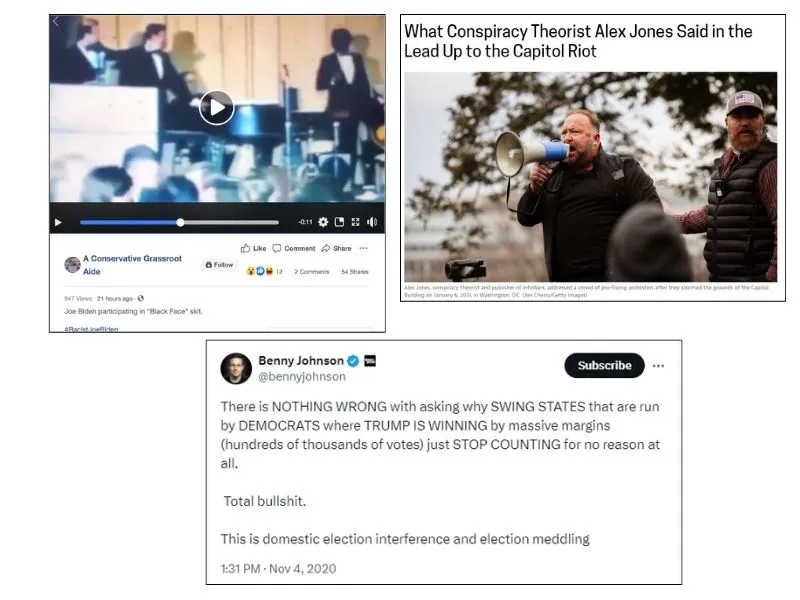
Screenshots of social media posts by influencers spread during the 2020 elections. (Source: Screenshots/X/Facebook/PBS Frontline/ Modified by Logically Facts)
It may be noted that while there are influencers spreading misinformation, some are using their social media to create awareness about important issues such as abortion rights.
Commenting on the role that influencers will be playing in the presidential election, Josephine Lukito, an Assistant Professor at the University of Texas at Austin’s School of Journalism and Media, who studies cross-platform media language in the global political communication context, told Logically Facts, “I don't think influencers are changing the way people vote, but influencers can contribute to polarized attitudes, spread misinformation, or introduce audiences to new information or news stories.“
According to data published by Pew Research in September 2024, Facebook and YouTube are top sources of news for Americans. “About a third of U.S. adults say they regularly get news on each of these two sites,” the report reads.
Twenty percent of Americans get their news on Instagram, 17 percent on TikTok, and 12 percent on X.
A chart reflecting on how platforms have seen notable growth in being used as news sources. (Source: PEW Research)
GenZ in the U.S. is significantly more likely to get political information from social media than traditional sources like TV. According to research by U.K.-based audience research company GWI, they are 58 percent more likely to consume political content on social platforms.
In August 2024, the Democratic National Convention (DNC) granted media credentials to over 200 content creators to cover the event at the United Center arena, highlighting the party's strategic use of influencers in their media efforts. Similarly, in July 2024, the Republican National Convention (RNC) approved over 70 influencers, acknowledging the significant role of digital creators in political outreach.
A report by Politico indicates that a Democratic Political Action Committee (PAC) has initiated a creators program, paying influencers to post content on platforms like TikTok and Instagram, aiming to engage younger voters.
Muenster noted that “the impact that influencers have on the public discourse around elections is significant, especially in this election.”
X has evolved in its role in spreading misinformation, especially after its acquisition by Tesla CEO Elon Musk. Musk’s ownership of X has also raised concerns as he has personally shared misinformation.
Muenster told Logically Facts that it is "terrifying" to see how one individual can misuse such a powerful platform for political purposes. “The impact that he can have, because he’s playing around with what posts get visibility, while simultaneously sharing deeply harmful Nazi content, is absolutely terrifying,” she added.
This surge in mis and disinformation is not limited to X alone. According to CNBC, misinformation is rampant on Facebook ahead of the 2024 elections in the U.S. In 2020 too, false information was frequently distributed through Facebook, where it reached a large audience, the report adds.
Meanwhile, a NewsGuard study from late 2022 found that one in five top search results on TikTok contained false or misleading information. During the 2020 elections too, TikTok had emerged as a key platform for political engagement and misinformation.
YouTube also remains a platform for spreading misinformation through video content. Influencers on YouTube often use persuasive video techniques and the longer video format to make false narratives more believable.
Muenster underscored that the way social media functions also influences the type of content users are exposed to.
Despite these social media platforms' efforts to combat misinformation, experts point out that these measures may not be sufficient.
Lukito stressed that platforms are lacking, “especially with regard to non-English misinformation and traditionally produced misinformation (the focus on generative AI output is too limiting).”
Muenster noted, “Platforms are taking steps that are important, but I don’t necessarily agree with every step. I don’t think it’s enough, but it’s better than what we’re seeing. People know how uncomfortable it is to use a platform that has no content moderation when they’re exposed to horrible content. The impact of individual social media platforms and their content prioritization significantly influences what users see.”
With a flood of real and misleading posts, along with fake news circulating online, it’s crucial to approach information with caution this election season.
According to Lukito, “Citizens need to have media literacy, which includes having a diverse media diet, double and triple-checking factual claims, and making sure they can distinguish between generative AI-made content, manipulated content, or true content.”
(Editor's Note: Logically Facts has reached out to all the aforementioned influencers. This story will be updated if and when we receive a response.)
(Edited by Shreyashi Roy and Kritika Goel)